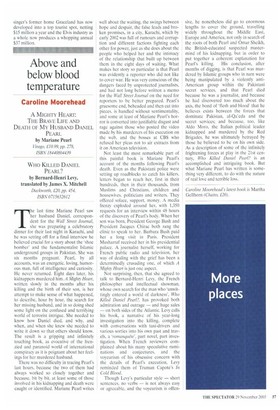Above and below blood temperature
Caroline Moorehead
A MIGHTY HEART: THE BRAVE LIFE AND DEATH OF MY HUSBAND DANIEL PEARL by Mariane Pearl Virago, £10.99, pp. 278, ISBN 18440804439 WHO KILLED DANIEL PEARL? by Bernard-Henri Levy, translated by James X. Mitchell Duckworth, .E20, pp. 454, ISBN 0715632612 The last time Mariane Pearl saw her husband Daniel, correspondent for the Wall Street Journal, she was preparing a celebratory dinner for their last night in Karachi, and he was setting off for a final interview he believed crucial for a story about the 'shoe bomber' and the fundamentalist Islamic underground groups in Pakistan. She was six months pregnant. Pearl, by all accounts, was an energetic, loving, humorous man, full of intelligence and curiosity. He never returned. Eight days later, his kidnappers murdered him. A Mighty Heart, written slowly in the months after his killing and the birth of their son, is her attempt to make sense of what happened, to describe, hour by hour, the search for her missing husband, and in so doing shed some light on the confused and terrifying world of terrorist intrigue. She needed to know how Daniel died, and why, and when, and when she knew she needed to write it down so that others should know. The result is a gripping and infinitely touching book, as evocative of the frenzied and paranoid world of international conspiracy as it is poignant about her feelings for her murdered husband.
There was no difficulty in tracing Pearl's last hours, because the two of them had always worked so closely together and because, bit by bit, at least some of those involved in his kidnapping and death were caught or identified. Mariane Pearl writes well about the waiting, the swings between hope and despair, the false leads and broken promises, in a city, Karachi, which by early 2002 was full of rumours and corruption and different factions fighting each other for power, just as she does about the people who helped her and the intimacy of the relationship that built up between them in the eight days of waiting. What makes her story so particular is that Pearl was evidently a reporter who did not like to cover war. He was very conscious of the dangers faced by unprotected journalists, and had not long before written a memo for the Wall Street Journal on the need for reporters to be better prepared. Pearl's gruesome end, beheaded and then cut into pieces, is handled without sentimentality, and some at least of Mariane Pearl's horror is converted into justifiable disgust and rage against those who posted the video made by his murderers of his execution on the web, and the bosses at CBS who refused her pleas not to air extracts from it on American television.
Not least the most remarkable part of this painful book is Mariane Pearl's account of the months following Pearl's death. Even as the Pakistani police were setting up roadblocks to catch his killers, letters began to reach her, first in their hundreds, then in their thousands, from Muslims and Christians, children and housewives, politicians and writers. They offered solace, support, money. A media frenzy exploded around her, with 1,350 requests for an interview within 48 hours of the discovery of Pearl's body. When her son was born, President George Bush and President Jacques Chirac both rang the clinic to speak to her. Barbara Bush paid her a long visit in Paris. President Musharraf received her in his presidential palace. A journalist herself, working for French public radio and television, her way of dealing with the grief has been a determinedly crusading one, of which A Mighty Heart is just one aspect. Not surprising, then, that she agreed to talk to Bernard-Henri Levy, the French philosopher and intellectual showman, whose own search for the man who 'unwittingly entered a world of darkness', ki/ho Killed Daniel Pearl?, has provoked both admiration and outrage — and huge sales — on both sides of the Atlantic. Levy calls his book, a narrative of his year-long investigation into the killing, complete with conversations with taxi-drivers and various sorties into his own past and travels, a `romanquete', part novel, part investigation. When French reviewers complained about his many speculative ruminations and conjectures, and the voyeurism of his obsessive concern with the details of Pearl's execution, Levy reminded them of Truman Capote's In Cold Blood.
Though Levy's particular style — short sentences, no verbs — is not always easy or agreeable, and the voyeurism is offen sive, he nonetheless did go to enormous lengths to cover the ground, travelling widely throughout the Middle East, Europe and America, not only in search of the roots of both Pearl and Omar Sheikh, the British-educated suspected mastermind of his kidnapping, but in order to put together a coherent explanation for Pearl's killing. His conclusion, after months of digging, is that Pearl was murdered by Islamic groups who in turn were being manipulated by a violently antiAmerican group within the Pakistani secret services, and that Pearl died because he was a journalist, and because he had discovered too much about the axis, the bond of 'flesh and blood' that be believes exists between the forces that dominate Pakistan, al-Qa'eda and the secret services; and because, too, like Aldo Moro, the Italian political leader kidnapped and murdered by the Red Brigades, he was ultimately betrayed by those he believed to be on his own side. As a description of some of the infinitely frightening forces at play in the 21st century, Who Killed Daniel Pearl? is an accomplished and intriguing book. But what Mariane Pearl has written is something very different, to do with the nature of real love and terrible loss.
Caroline Moorehead's latest book is Martha Gelthorn (Chatto, £20).


























































































 Previous page
Previous page